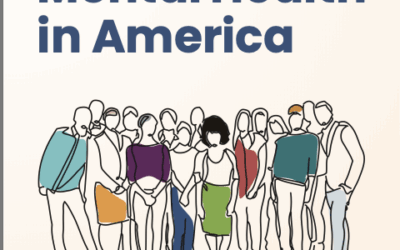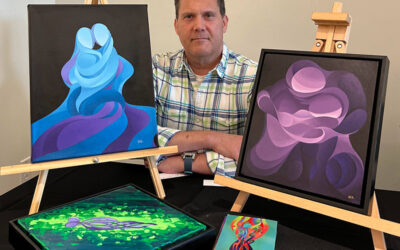**Trigger Warning: Transphobia/Homophobia and Violence**
I would like to preface this post by mentioning that I am a white woman who benefits all from white, cisgender, and heterosexual privilege, and I am writing this as an ally to the LGBTQIA+ and BIPOC community. I cannot and will never be able to speak from experience, but have read about sexuality and gender identity issues and learned from my friends, peers, and classmates who are a part of the LGBTQIA+ community. In learning about the mental health implications of LGBTQIA+ discrimination and violence, I want to commit to being an ally by amplifying marginalized voices during this Pride Month, through this blog, and always.
Additionally, I would like to recognize the importance of intersectional analyses when looking at social justice issues, as we cannot look at social identities on their own terms. Dr. Kimberlé Crenshaw coined the term “intersectionality” in 1989, “to describe the way people’s social identities can overlap,” and “the way in which various forms of inequality often operate together and exacerbate each other.” For example, inequality based on gender, class, immigrant status, sexuality, race, or ability. Rather than looking at these social identities separately, it’s important to take an intersectional lens to recognize that some people are subject to several or all of these forms of discrimination, not simply the sum of them.
I bring this term up before diving deep into the mental health implications of LGBTQIA+ discrimination because we must recognize that we cannot look at sexual orientation alone. We must look at how race, gender identity, class, and other identities intersect with sexuality to understand the holistic view of how an LGBTQIA+ person might experience discrimination.
For example, transgender women of color face challenges unique to their different social identities than a white, cisgender lesbian woman might face. This is not at all to say that both people may struggle, but that the latter example will not also face discrimination based on her gender identity or race. In 2019 alone, there were at least 26 murders of trans women in 2019, most of which were trans women of color. These brutal acts of violence illuminate the intersections of racism and transphobia and how they create additional barriers, such as to safe housing and employment. If you want to read more about intersectionality and white privilege, I encourage you to check out this collection of resources from Rider University.
For the purpose of this post, I will be honing in on Pride Month and the LGBTQIA+ community in broader terms during the COVID-19 pandemic, but I just wanted to take the necessary time to highlight intersectionality and its importance.
As COVID-19 ramped up and students were sent home from their universities starting in March, LGBTQIA+ students may have faced additional stressors and challenges to getting home safely.
For many college students who identify as LGBTQIA+, college is often a safe haven and escape from an unaccepting home environment. Higher education is often a place for a young adult’s own identity development independent from the person they were in high school. According to the Human Rights Campaign 2018 LGBTQ Youth Report, here are some statistics that show the struggles of LGBTQ-identified youth aged 13-17 in numbers:

It is clear that, according to this 2018 data, home is not always a safe or affirming place for LGBTQIA+ youth. In addition to abuse and lack of support, LGBTQIA+ youth may fear being misgendered. For students who felt safe to come out in their college environments, but not their home communities, being sent home due to COVID-19 creates a whole new set of stressors.
It is also important to recognize that a disproportionate percentage of the youth homeless population identifies as LGBTQIA+. In November 2017, the University of Chicago released a report disclosing that “LGBTQ young adults had a 120 percent higher risk of reporting homelessness compared to youth who identified as heterosexual and cisgender,” as the Human Rights Campaign reported on their blog. The reason for such a high risk of homelessness among this population is often “from a lack of acceptance that young people experience both in and outside of the home,” according to the report (13). For many LGBTQIA+ college students who do not have a home to return to amidst COVID-19, they are at risk of homelessness if they are not able to access the college dorm housing. As I described in my second blog post on abusive homes, not all colleges have the resources to keep students on campus during a global pandemic.
With this knowledge and in solidarity during Pride Month, it is so important to support the LGBTQIA+ communities and youth who have been impacted by COVID-19. Due to the increasing rate of homelessness for this population, they are often subject to additional financial and health issues. We as a society need to recognize the deep systemic issues that LGBTQIA+ youth and communities face, as the fight is far from over from achieving full equity.
As I described above, I stand in solidarity with the LGBTQIA+ community and I will continue working to be an advocate for LGBTQIA+ rights. If you are an ally, please check in on your LGBTQIA+ friends and family, and consider donating to human rights organizations and advocating alongside the lives of marginalized people.
For LGBTQIA+ folks seeking support and resources during this time of the pandemic and Pride Month, which may not be easy for everyone, I have compiled a comprehensive list of services, hotlines, and information below. As I mentioned above, discrimination on the basis of someone’s sexual orientation can have psychological and physiological impacts on LGBTQIA+ folks. During these times of increased isolation due to COVID-19 and additional stressors, I have listed support resources below. I also understand that many people’s identities require an intersectional analysis, as sexuality and gender identity often intersect with race and class as well. For that reason, BIPOC who need additional support resources right now can refer to my last blog post with a list of resources and hotlines. Furthermore, for individuals in unsafe home environments or survivors of abuse/violence, you can access resources at this list I compiled here.
For allies seeking tools to become an LGBTQIA+ rights activist and standing up against injustice, I recommend this list from CNN on how to be a positive ally to friends and co-workers.
Please feel free to share these resources to help stand up against discrimination against sexual/gender minorities and/or to become a better ally.
Direct Care/Hotlines for LGBTQIA+ Folks:
The Trevor Project: 24/7, confidential, and free
- A national organization providing crisis intervention and suicide prevention services to (LGBTQ) young people ages 13-24.
- Call 1-866-488-7386 to access the TrevorLifeline suicide prevention and crisis intervention phone service or online chat here
- Text START to 678-678 to access confidential, 24/7 TrevorText with a counselor
LGBT National Hotline: free and confidential, M-F 4:00 pm-midnight & Saturday noon-5 pm (EST)
- Call 888-843-4564 or email help@LGBThotline.org to talk and receive resources for different issues and concerns including, but not limited to, coming out issues, gender and/or sexuality identities, relationship concerns, bullying, workplace issues, HIV/AIDS anxiety, safer sex information, suicide, and much more
- For LGBTQ folks under the age of 25, access the LGBT National Youth Talkline by calling 800-246-7743 or by emailing help@LGBThotline.org
Trans Lifeline: free and confidential, 10 am-4 am EST each day
- A trans-led organization that connects trans people to the community, support, and resources they need to survive and thrive
- Call 877-565-8860 in the U.S. or 877-330-6366 in Canada or email contact@translifeline.org for confidential support from trans-identifying counselors
CenterLink LGBT Community Center Member Directory
- Find LGBT health centers in each state through this directory here
Lambda Legal
- A national organization committed to achieving full recognition of the civil rights of lesbians, gay men, bisexuals, transgender people and everyone living with HIV through impact litigation, education and public policy work, website here
Virginia Anti-Violence Project LGBTQ+ Helpline, 24/7, confidential, and free
- Call 866-356-6998 or text 804-793-9999 for LGBTQ+ folks looking for information or help regarding intimate partner abuse, sexual assault, and stalking
- Access to live online chat here
- The VAVP also has individual support services and advocacy you can read here
Health Brigade
- Virginia’s oldest free clinic located in Richmond with medical, mental health, community outreach, and care coordination services for low-income and uninsured persons
- Call 804-358-6343 to speak to the medical clinic and check your eligibility to access services here
LGBT Life Center
- Empowers the LGBTQ communities and all people affected by HIV through improving health and wellness, strengthening families and communities, and providing transformative education and advocacy in Virginia
- Access the website here or use the contact form to talk to a professional
- Five locations in Norfolk and Newport News, Virginia
National Queer and Trans Therapists of Color Network
- The Mental Health Fund (MHF) for Queer and Trans People of Color provides financial support for QTPoC to work with psychotherapists in an effort to address the economic barriers inherent in healthcare and the mental health system
- The Mental Health Fund provides financial support for up to 6 sessions with a psychotherapist. Applicants can request up to $100 per session. Learn more about the application process here
- The QTPoC Mental Health Practitioner Directory can be accessed here to find licensed practitioners across the country that are registered with the network
Pride Institute:
- The admissions staff is available 24/7 by calling 888-616-5031 for a no-cost assessment and through the online contact form here
- The Pride Institute supports LGBTQ folks in recovery from addiction and mental health issues, including a Residential Treatment Center Program, Partial Hospitalization with Lodging, Intensive Outpatient Program, and a Kindred Family Program with main campuses in Eden Prairie, Minneapolis, and Rochester, Minnesota as well as access to online educational topics here
National Runaway Safeline: 24/7, confidential, and free
- Call 1-800-786-2929, text 66008, or access free online chat here to assist runaway, homeless, and at-risk youth with crisis intervention and safety planning services
Crisis Text Line: 24/7, confidential, and free
- Free texting service that can be accessed by texting HOME to 741741 for free, 24/7 crisis counseling
National Suicide Prevention Lifeline: 24/7, confidential, and free
- Call 1-800-273-8255 for distress, prevention and crisis resources for you or your loved ones, and best practices for professionals or online chat here
Mental Health America:
- Free online screening tools for mental health conditions here
- General resource list for COVID-19 and mental health here
- For Virginia constituents:
- The Mental Health America of Virginia Warm Line is available at 1-866-400-MHAV (6428) for mental health resources and referrals in Virginia
Additional Resources for LGBTQIA+ Folks:
- Law Resources for LGBTQ+ Families, list of law firms and services regarding employment, family law and divorce, healthcare rights, military rights, trans rights, senior issues, and youth issues for the LGBTQ+ community
- Centers for Disease Control and Prevention (CDC), list of LGBT Health Clinics by state and city
- TrevorSpace, an online international peer-to-peer community for LGBTQ young people and their friends
- EqualityVirginia, the leading advocacy organization in Virginia seeking equality for lesbian, gay, bisexual, and transgender people with legal and support resources
- Trans Teens Online Talk Group, a weekly moderated group for trans and gender-expansive youth ages 12 to 19, to talk in a safe space and to be able to fully express themselves 7-10 pm EST on Thursdays and Fridays
- Q Chat Space, an online community for LGBTQ+ teens to find and give support, have fun, connect around shared interests and get good information
- National Center for Transgender Equality, Coronavirus (COVID-19) Guide for trans people and their families to stay safe
- “Going To Therapy As A QTPOC, Without Being Harmed, Erased Or Baffled”, an article from BGD on finding the right therapist for you as a queer and/or trans person of color who needs support
- “Why I Needed to See a Queer Therapist (And How You Can Find One, Too)”, an article from Them. on finding a queer-affirming therapist and resources to do so
- LGBTQ Youth: 4 Ways You Can Prepare to Safely Access Housing Services, steps and information on your rights under HHS’s rules
- GLAAD, a dynamic media force that tackles tough issues to shape the narrative and provoke dialogue that leads to cultural change for LGBTQIA+ rights
- Black Transmen Inc., health care support services, support groups for Black Transmen/Transwomen/Non-Binary Folks, mentoring, housing stability services, and leadership conferences
- University of Richmond LGBTQ+ Campus and Community Resources, with lists of local, national, and trans-specific resources in Richmond and around the country
Useful Articles, Links, and Resources for Allies:
- COVID-19 Mutual Aid Fund for LGBTQI+ BIPOC Folks, GoFundMe Page to donate to in support of queer communities of color struggling due to COVID-19
- True Colors United, implements innovative solutions to youth homelessness that focus on the unique experiences of LGBTQ young people which you can donate to or take action with to pass important legislation with a Learning Community as well
- “The Ultimate LGBTQIA+ Pride Book List”, compiled by Penguin Random House on books to read on LGBTQIA+ stories and history
- LGBTQ+ Films and Documentaries, compiled by GLAAD on documentaries and films to watch this pride month on the stories and history of sexual freedom/rights
- Planned Parenthood Info and Resources for LGBTQ Teens and Allies, list of resources and tips for allies when supporting the LGBTQ community
- GLSEN Ally Week, resources on how to facilitate an Ally Week at your school in September as well as information on how to be an ally and support the LGBTQ+ community by recognizing your privilege
- Advocates for Youth, works alongside thousands of young people here in the U.S. and around the globe as they fight for sexual health, rights, and justice
- PFLAG Guide to Being a Straight Ally, a guide where all people who care about fairness can honestly and openly discuss and remove the barriers they face to becoming allies, get specific recommendations for action, and learn how to assist others
- “9 Black LGBTQ Organizations to Donate to Right Now”, a list by Vanessa Maki on a list of Black-run nonprofits for racial and sexual justice to donate to now
- Human Rights Campaign, a national network for Americans to become personally involved in the fight for lesbian, gay, bisexual, transgender and queer equality
- Parents and Friends of Lesbians and Gays (PFLAG), 400+ chapter network provides confidential peer support, education, and advocacy for LGBT people, their families, friends, and allies
- LGBT Homelessness, statistics, action items, places to donate, and resources on understanding LGBT homelessness in the U.S.
Anna Marston, Intern
Mental Health America of Virginia



